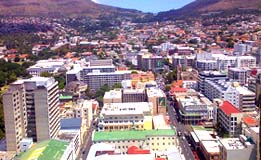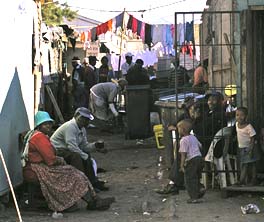
The notion of a ‘Mother City’ [1] is seriously misleading and far from the truth. The available evidence compels one to conclude that Cape Town is a mother only to white people; the few people of color that the ‘Mother City’ adopts as its sons and daughters are adopted on specific, regulated conditions.
Take Camps Bay, an affluent suburb for the rich and the powerful, for example. People on that side of town live it up. You can see this from the huge houses that Camps Bay people live in and the expensive cars that they drive. There is so much privilege that comes with being a son or a daughter of the ‘Mother City’. Those fortunate enough to be born in this caste have no qualms admitting that this city works for them, and only them.
I challenge you to compare this other world of privilege and the other world of the poor and economically marginalized. Let us call this other world "The Other Mother City". In the world of privilege, it is common to see privileged people jogging along the ocean with their iPods, while some other more privileged people can be seen walking their well-fed dogs. This is a world of ‘cafe society’.
In "The Other Mother City", people consider themselves lucky if they have dinner or even breakfast. It is a world made up of poor people, a starved people living in miserable conditions. Those brave enough to be wage slaves, work long hours in businesses managed by slave drivers.
Unlike the people in the privileged world, the people in "The Other Mother City" barely have resources to get ahead in life. While those from the privileged world are part of the international jet set, the people from "The Other Mother City" have to struggle for taxi fares to travel from the townships to Cape Town city center. The people from the "Other Mother City" live in shacks and tiny houses; they battle to make ends meet. They live in despicable environments, where streets are crime ridden — and police are in cahoots with gangsters. The schools in "The Other Mother City" are overcrowded and lack essential resource. Most teachers have very little formal training and are overworked.

The world of privilege is largely made up of white people who control most of the resources in the land. The research shows that 80 percent of the arable land in the region is still controlled by white farmers. Furthermore, over 95% of the Johannesburg Securities Exchange is still controlled by white people. It is this reality that enables white people to either own or manage workplaces in this privileged world.
The racial windfall makes this world of privilege a predominantly white society. It is a society that champions ‘white’ culture, norms and values. Cultural norms and values that contradict this society are seen as inferior. In short, this is a society based on white
supremacy.
Consequently, white supremacist ways of seeing are propagated through mass media and popular culture. In his excellent book "White Like Me", Tim Wise writes that people of color can hardly avoid white supremacist structures. Wise notes that this is because "to have much opportunity in the job market, or success in education, typically requires a fairly high level of interaction with white folks, since so much of the power within… resides in white hands." In other words, white supremacy is institutionalized and that for black people to get ahead in this system means not to challenge the status quo. Thus, some might end up "see[ing] the world through the lens of white supremacy",
writes bell hooks. Those who dare to resist and challenge the status quo can be punished severely. Thus, as hooks notes, "to love blackness as political resistance is dangerous in a white supremacist culture–so threatening, so serious a breach in the fabric of the social order, that death is the punishment."
Wise writes that "to be white is to be born in an environment where one’s legitimacy is far less likely to be questioned than would the legitimacy of the people of color, be it in terms of where one lives, where one works, where one goes to school, or pretty much anything else." Wise further notes that, "to be white" in a white supremacist society "is to be born into a system that has been set for the benefit" of white folks "and as such provides a head start" to whites only.
The privileges and advantages that white people receive at the expense of the people of color produce "The Other Mother City". To change the status quo means that those from "The Other Mother City" "…need to push against the boundaries to find" ways to effectively subvert the ‘cafe society’. We "need to pose critical alternatives, and transform our worldviews and move away from" the white supremacist ways of seeing, writes bell hooks.
As for a critical alternative, resisting white supremacy without challenging the capitalist system will be ineffective and self-destructive, to say the least. Malcolm X wrote that the, "political, economic, and social atmosphere" of any capitalist society "nourishes a racist psychology in " people. Therefore, our fight against white supremacy is not only against racism, but also against the whole racist patriarchal capitalist system.
What we need is an economy that encourages diversity, self-management, and equity. In other words, an effective alternative should include abolishing capitalism and replacing it with an economy that is based on justice and equality. Keeping in mind that our goal, as Michael Albert, notes "is not to erase diverse cultures but to enjoy their benefits."
Thus, to win an equal society that would not be based on racist notions and hierarchies, we need to be daring, and strive to build a just society.
***
Phumlani Majavu is an activist and a freelance writer based in Cape Town. [email protected]
Note:
[1] Mother City is a historically loaded colonial concept that claims that Cape Town is a land where ‘colored’ people in South Africa originate from. The assumption is that through sexual exploitation of slaves by white settlers, colonial Cape Town gave birth to a ‘new race’ known as ‘colored’ people. Hence, one could say that Cape Town is a Mother City to ‘colored’ people and white South Africans just like Africa is Motherland to African-Americans.
Photos reprinted here under a Creative Commons license
